Please take a moment to enjoy this amazing video circulating on the net of Michael Fishbach's (co-founder of The Great Whale Conservancy) story of his close encounter and subsequent rescue of a young entangled humpback whale. Great work!!
Showing posts with label fishing gear. Show all posts
Showing posts with label fishing gear. Show all posts
Tuesday, 19 July 2011
Sunday, 23 January 2011
Belize Banishes Destructive Trawling - Huffington Post
One of my most favourite places in the world, Belize, is becoming a leader for countries trying to reduce their environmental impact on the seas. As of December 8th, Belize has placed a complete and permanent ban on trawling, one of the most destructive methods of fishing in the world.
A brief definition of trawling and its impacts:
"Bottom trawling is one of the most destructive fishing methods in existence. Bottom trawlers are equipped with massive, weighted nets that effectively clear-cut the ocean floor, destroying sensitive coral communities and anything else in their path.
Meanwhile, shrimp trawls -- which were operating in Belize until now -- operate in midwater, so they pose a different threat. They catch more untargeted species, or bycatch, than almost any other kind of fishing gear. Thousands of sea turtles, marine mammals and untargeted fish are caught in shrimp trawlers around the world every year."
Belize is home to the second largest coral reef system in the world, - the Mesoamerican Barrier Reef - second only to the Great Barrier Reef of Australia. It is a hotspot for divers and snorkelers around the world. (Personally, I'd highly recommend it! I wasn't diving at the time, only snorkeling, but I saw TONS of cool stuff and will definitely go back to dive as soon as I can!)
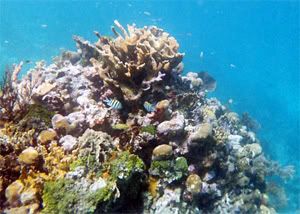
One of my own from Belize :)
Full article here (Huffington Post)
A brief definition of trawling and its impacts:
"Bottom trawling is one of the most destructive fishing methods in existence. Bottom trawlers are equipped with massive, weighted nets that effectively clear-cut the ocean floor, destroying sensitive coral communities and anything else in their path.
Meanwhile, shrimp trawls -- which were operating in Belize until now -- operate in midwater, so they pose a different threat. They catch more untargeted species, or bycatch, than almost any other kind of fishing gear. Thousands of sea turtles, marine mammals and untargeted fish are caught in shrimp trawlers around the world every year."
Belize is home to the second largest coral reef system in the world, - the Mesoamerican Barrier Reef - second only to the Great Barrier Reef of Australia. It is a hotspot for divers and snorkelers around the world. (Personally, I'd highly recommend it! I wasn't diving at the time, only snorkeling, but I saw TONS of cool stuff and will definitely go back to dive as soon as I can!)

One of my own from Belize :)
Full article here (Huffington Post)
Sunday, 26 September 2010
Turkey to Eliminate Driftnets in 2011 - Oceana
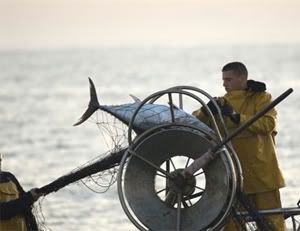
photo credit Oceana & Carlos Suarez
"It’s estimated that thousands of creatures, including whales, dolphins, sharks and sea turtles, are trapped by the indiscriminate fishing gear each year."
And that's a great reason to stop using it. European organizations estimate there are over 500 illegal fishing vessels operating in the Mediterranean - some with driftnets up to 12 miles long! As a result, Morocco recently announced its plans to end the use of driftnets in the Med, and as of Wednesday it was announced that Turkey has jumped on board as well. Great news for countless marine species!
"The UN passed an international moratorium on driftnets 15 years ago, and the EU instituted a ban seven years ago, but many French, Italian and Moroccan vessels have continued using them."
While the news of the upcoming ban falls on grateful ears, laws like this have a history of being ignored and there is potential for legal loopholes. Let's hope the ban gets implemented and supported successfully!
Full article here (Oceana)
Wednesday, 4 August 2010
Sharks, Blue-Fin Tuna and Overfished Oceans - The New Yorker
"The sorry state of ocean life has led to a new kind of fish story—a lament not for the one that got away but for the countless others that didn’t. In “Saved by the Sea: A Love Story with Fish,” David Helvarg notes that each year sharks kill some five to eight humans worldwide; meanwhile we kill a hundred million of them. Dean Bavington, the author of “Managed Annihilation: An Unnatural History of the Newfoundland Cod Collapse,” observes that two hundred billion pounds’ worth of cod were taken from Canada’s Grand Banks before 1992, when the cod simply ran out. In “Four Fish: The Future of the Last Wild Food,” Paul Greenberg estimates that somewhere in the range of a hundred million salmon larvae used to hatch in the Connecticut River each year. Now the number’s a lot easier to pin down: it’s zero. “The broad, complex genetic potential of the Connecticut River salmon,” Greenberg writes, has “vanished from the face of the earth.”"
Full article here (The New Yorker)
Full article here (The New Yorker)
Sunday, 30 May 2010
Hundreds of Discarded Toilets and Tires Discovered at a California Reef - Discovery News
And now for some more interesting (and slightly amusing...slightly) news:
"Over 300 discarded toilets, along with other unusual garbage, have been discovered at a reef off California's Malibu coast."
Um...what?
The University of California Davis Wildlife Health Center and California Lost Fishing Gear Recovery Project are teaming up to remove the junk. Since May 2006, they have removed 17 tons of commercial and 1,400 pounds of recreational fishing gear. However, this is the first time they have removed items such as these, which included about 300 tires in addition to the toilets and other garbage.
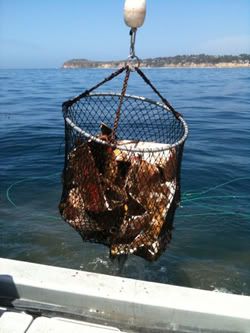
photo credit Discovery News
"No one at present knows who dumped the toilets and tires.
But everyone can help clean up California's underwater coast by reporting sightings of lost fishing gear or loss of gear to (888) 491-GEAR (calls are toll-free) or to www.lostfishinggear.org."
Full article here (Discovery News)
"Over 300 discarded toilets, along with other unusual garbage, have been discovered at a reef off California's Malibu coast."
Um...what?
The University of California Davis Wildlife Health Center and California Lost Fishing Gear Recovery Project are teaming up to remove the junk. Since May 2006, they have removed 17 tons of commercial and 1,400 pounds of recreational fishing gear. However, this is the first time they have removed items such as these, which included about 300 tires in addition to the toilets and other garbage.

photo credit Discovery News
"No one at present knows who dumped the toilets and tires.
But everyone can help clean up California's underwater coast by reporting sightings of lost fishing gear or loss of gear to (888) 491-GEAR (calls are toll-free) or to www.lostfishinggear.org."
Full article here (Discovery News)
Saturday, 22 May 2010
Vaquita: Will a Tiny Porpoise Be the Next Endangered Species to Go? - TakePart
"With the arrival of Endangered Species Day, it’s time to shed some light on a startling reality: the world’s most critically endangered marine mammal is a species you’ve never heard of that lives just a day's drive south of the U.S. border."
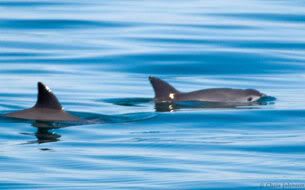
photo credit TakePart via Chris Johnson
The poor little vaquita. It's a tiny little porpoise that lives in the Gulf of California near Baja. It's cute, it's shy, its name translates to "little cow" (aww!) and it's being killed in gillnets at an alarming rate. Today, only about 200 individuals remain. Because of its elusiveness, the only photos that have been available (until recently) are of dead vaquitas in gillnets.
"Without images like those showing dolphins and whales swimming in—and leaping out of—clear waters, it’s been hard to build an awareness campaign around the vaquita...With that scenario, researchers and conservationists worry that the vaquita will go the way of the baiji, or Yangtze River dolphin, a large species that was declared extinct in 2006 amid chaotic efforts to save it."
But there is good news: "“Basically we don’t have any reason to believe that if we stopped killing them in fishing nets, that the population wouldn’t be able to recover,” says Barbara Taylor, a vaquita expert and conservation biologist with the National Marine Fisheries Service"(NMFS).
The Mexican government has invested $25 million in vaquita conservation, most of it going to research funding and efforts to end the use of gillnets.
Full article here (TakePart)

photo credit TakePart via Chris Johnson
The poor little vaquita. It's a tiny little porpoise that lives in the Gulf of California near Baja. It's cute, it's shy, its name translates to "little cow" (aww!) and it's being killed in gillnets at an alarming rate. Today, only about 200 individuals remain. Because of its elusiveness, the only photos that have been available (until recently) are of dead vaquitas in gillnets.
"Without images like those showing dolphins and whales swimming in—and leaping out of—clear waters, it’s been hard to build an awareness campaign around the vaquita...With that scenario, researchers and conservationists worry that the vaquita will go the way of the baiji, or Yangtze River dolphin, a large species that was declared extinct in 2006 amid chaotic efforts to save it."
But there is good news: "“Basically we don’t have any reason to believe that if we stopped killing them in fishing nets, that the population wouldn’t be able to recover,” says Barbara Taylor, a vaquita expert and conservation biologist with the National Marine Fisheries Service"(NMFS).
The Mexican government has invested $25 million in vaquita conservation, most of it going to research funding and efforts to end the use of gillnets.
Full article here (TakePart)
Thursday, 20 May 2010
Crews Fish Out Lost Nets to Save Trapped Wildlife - USA Today
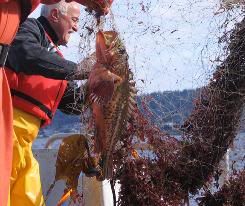
photo credit USA Today via Bryan DeLong
The problem with lost fishing gear? It keeps fishing.
"Ghost nets" are fishing nets that have been lost at sea due to accident, damage or storms. They drift freely through the water, capturing and killing any animal unfortunate enough to become entangled. The victims can be fish, sharks, invertebrates, sea turtles, and marine mammals such as seals and whales.
The cycle is potentially endless: Nets will be lost at sea, fish will become entangled and killed. The weight of all the dead biomass makes the net sink to the bottom, which attracts scavengers who may themselves become entangled. Once enough dead material has been eaten away, the net will rise up and begin to float through the sea again, capturing and killing indiscriminately. And over, and over. The Northwest Straits Marine Conservation Initiative in Washington State has retrieved 2,775 nets with close to 54,000 dead animals entangled. And that's just since 2002.
But it's not just nets - crab pots, fish traps and lobster gear gets lost too, and it continues to work. The Virginia Marine Resources Commission pulled over 9,000 crab pots from Chesapeake Bay last winter and found 9,800 animals trapped.
But there is a silver lining. Covanta Energy Corp., National Fish and Wildlife Foundation Washington (NFWF), National Oceanic and Atmospheric Administration (NOAA) and Schnitzer Steel have come together to offer fisherman a free way to dispose of aged fishing gear responsibly. It is collected from 19 ports in seven states, and either recycled by Schnitzer or converted into power by Covanta's energy-from-waste facility, which I think is pretty cool.
Full article here (USA Today)
Subscribe to:
Posts (Atom)